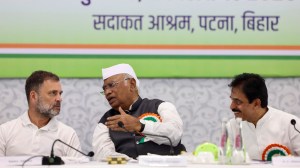Stay updated with the latest - Click here to follow us on Instagram
NIDs elective similar to Swedish design death course
Well,that may be something close to what students at the National Institute of Design learn in an open elective that includes experience design,trend-spotting and talent management.
Ever heard of designing a good death?
Well,that may be something close to what students at the National Institute of Design (NID) learn in an open elective that includes experience design,trend-spotting and talent management.
As part of the course in the category of Think Tank The Future of Talent within Interdisciplinary Collaborations: An Interdisciplinary Think Tank on Forecasting Trends students from Sweden will visit NID to collaborate and exchange ideas on how to spot trends and design experiences.
The course is a three-year program with Konstfack University College of Arts,Craft and Design,Sweden,and the Stockholm School of Entrepreneurship. Konstfack University,incidentally,is the only institute in the world to offer an Experience Design course.
Professor Roland Jones of Konstfack University,also an off-campus visiting professor at NID,is currently on-campus for preliminary lectures.
Some of the projects Professor Jones is working on in Stockholm involve cancer patients at a hospital there. He and his team have been interviewing hospital staff,patients and their relatives for a decade.
One such project has been to design a good death,as Professor Jones put it,where they have interviewed people on what they feel about the last week of terminally-ill patients.
The findings revealed three main perceptions of time patients who find time slipping by,relatives hoping for a swift end instead of their loved ones suffering and the staff,who are used to such situations.
The design team attempts a compromise among these perceptions of time and uses methods (like how the patient is treated in terms of costume,the room,or anything,as Professor Jones puts it) that would be most compatible for all involved.
The project is ongoing and the answers are not concrete yet,he admits.
Other projects include simple things like designing soundproof chemotherapy rooms in the hospital because patients unanimously agreed that the humming of the MRI machines upstairs is very upsetting,and positioning computers in such a way that the doctors can have eye-to-eye conversations with the patients while diagnosing them. The current course at NID may not see students doing such designs right away. But for a start,they are designing an experience of India for the foreign students who will arrive on Monday.
The foreign students will also bring an experience of Sweden they have designed for their Indian counterparts. I dont know exactly what they will do,but for one,they might have to turn up the air-conditioning, Boopathy,a PG graphic design student and co-ordinator for the elective said on a light note.
The NID students began brainstorming this Wednesday evening on how the design would turn out,marking the blackboard with suggestions ranging from Kapadi to lighting diyas,wearing traditional dresses to traditional Indian games,finally dispersing close to dusk to meet again later.
NID Professors Shilpa Das and Shashank Mehta,who handle the elective,said experience design goes beyond ergonomics where products are designed keeping in mind the users comforts foremost. Here,experiences are designed,not products, said Professor Das. The other component of the course trend spotting will look at the trends in Ahmedabad.
A trend goes somewhere,either negatively or positively,and designs can be made to coincide,check or arrest that, said Professor Mehta. This is the third Think Tank course. The previous courses resulted in academic publications titled Local becomes global and The future of urban living.
A compilation of the three years publications will be published as a book,and a course module may be developed,said Professor Mehta.







